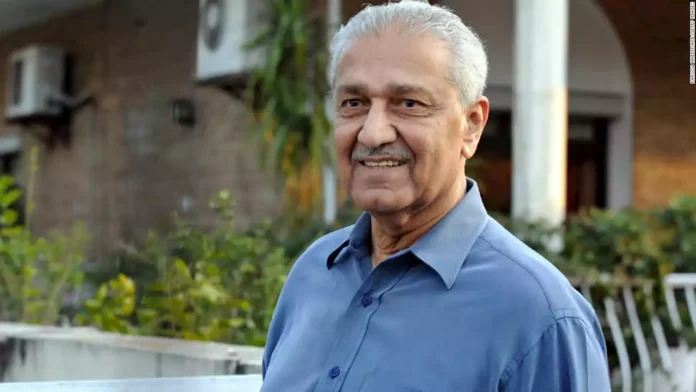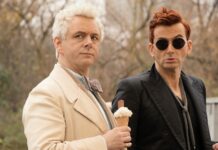Khan was a Pakistani scientist who secretly sold nuclear technology to Iran, North Korea and Libya. The West became aware of his activities in the 1980s, but it wasn’t until 1998 that he was finally brought to justice.
Abdul Qadeer Khan is a Pakistani scientist who has been accused of secretly selling nuclear technology to Iran, North Korea, and Libya. He was also involved in the proliferation of nuclear weapons and materials throughout the world.
Abdul Qadeer Khan, a Pakistani scientist who helped his nation develop its first atomic bomb and then transferred nuclear-weapons technology and know-how with countries the US considers rogue states, died on Sunday. He was 85 years old at the time.
Dr. Khan was hailed as a hero at home for making Pakistan the sole nuclear-armed nation in the Islamic world, providing a deterrence to Pakistan’s archrival, India, which also has nuclear weapons.
He operated a covert network selling nuclear-weapons technology in other countries. Libya, Iran, and North Korea, all of which are hostile to the United States, benefited from his knowledge.
Pakistan held a state burial for him on Sunday, with the national flag flying at half-staff.
Dr. Khan was hailed by Prime Minister Imran Khan for his “vital contribution” to Pakistan’s nuclear-weapons status. “This has protected us against an aggressive, much bigger nuclear adversary.” He was a national hero for the people of Pakistan,” he remarked on Twitter.
According to physicians who treated him, Dr. Khan died of respiratory problems as a result of a Covid-19 infection.
Dr. Feroz Khan, a former officer in Pakistan’s nuclear-weapons program who is now a professor at the Naval Postgraduate School in Monterey, Calif., claimed Dr. Khan was able to build up a global network to obtain the necessary equipment and then supervise the bomb’s construction.
“Pakistan would not have had nuclear weapons if it hadn’t been for Dr. A.Q. Khan,” the professor added. “However, his irresponsible conduct put the Pakistan program in jeopardy.”
He claimed that after using his network of businesses and corporations to help Pakistan obtain nuclear technology in the 1970s and 1980s, he subsequently reversed the process and sold the know-how to other nations for personal gain.

Abdul Qadeer Khan is revered in Pakistan as a hero for making Pakistan the sole nuclear-armed nation in the Islamic world and providing a deterrence to India.
Senator Mushahid Hussain, who was information minister when Pakistan tested its nuclear weapon in 1998, said Pakistanis believed Dr. A.Q. Khan saved the country not only from India but also from the United States after the Sept. 11, 2001, attacks, which prompted Washington to go to war with Afghanistan and then Iraq. Pakistan was a key backer of Osama bin Laden’s Taliban government, which was based in Pakistan. Pakistanis believed they were less likely to be attacked because they had nuclear weapons, he added.
“A.Q. Khan is a true Pakistani national hero.” Mr. Hussain said, “He defied the world, he defied the odds, he demonstrated that it can be done by a Muslim, by a Third Worlder.”
Dr. Khan was placed under house arrest in 2004 after the US presented Pakistan with proof of his proliferation efforts. In an impassioned speech on national television, he confessed to his involvement in worldwide proliferation and accepted full responsibility for “errors of judgment linked to illegal proliferation operations.”
“It saddens me to know in hindsight that my whole career accomplishment of delivering flawless national security to my country might have been jeopardized by my actions,” the scientist stated in 2004.
He spent the remainder of his life in his luxurious villa in Islamabad’s lush suburbs, guarded by highly armed military men. Pakistani authorities expressed concern that he might be abducted and questioned by foreign intelligence operatives. Nuclear inspectors were not given access to him from the outside.
He was never accused of any wrongdoing. He claimed in 2008 that he was forced to make the 2004 confession. Friends claim he was mistreated by Pakistan.
Pakistan’s strong military has consistently denied any participation in his nuclear weapons program.
Dr. Khan “took one for the team,” according to Michael Krepon, co-founder of the Stimson Center, a Washington think tank. Dr. Khan “took one for the team,” according to Michael Krepon, co-founder of the Stimson Center, a Washington think tank. Mr. Krepon said that part of the proliferation was authorized by the government, but that other sales were the result of Dr. Khan’s personal initiative.
Pakistan is thought to have produced more nuclear weapons than India, he added.
Subscribe to our newsletter
The tenth point.
Every day, a customized, guided tour of The Wall Street Journal’s greatest scoops and articles.
According to a report published this year by the Stockholm International Peace Research Institute, Pakistan possesses 165 nuclear weapons, whereas India has 156.
Mr. Krepon said, “The system that A.Q. Khan developed does not include a closedown switch.”
The 1971 war with India, which saw half of Pakistan secede, persuaded Pakistan that it required nuclear weapons since conventional troops would always be hopelessly outgunned. India conducted a nuclear test in 1974.
Dr. Khan, who approached the Pakistani government with a strategy for achieving that goal, was the guy with the plan. He was a metallurgical engineer, not a nuclear physicist, working in the Netherlands at a uranium enrichment facility at the time. He took the centrifuge blueprints and returned to Pakistan in 1976 to join a clandestine nuclear weapons development operation.
He was to lead the program and wield tremendous authority with few checks, eclipsing many other scientists who had played important roles in the development of the Pakistani bomb.
Mr. Krepon claimed that in the 1980s, Islamabad was a close US partner in a cooperative effort to support Islamist rebels against the Soviet invasion of Afghanistan, with Washington ignoring information that Pakistan was building nuclear weapons.
Libya eventually revealed information of its dealings with Dr. Khan to the US in 2003, which exposed his nuclear-technology-sale business. However, at that time, Pakistan had re-established itself as a vital partner in the “war on terror” against al Qaeda and the Taliban, and Washington’s pressure on Islamabad had lessened.
Toby Dalton, co-director of the Carnegie Endowment’s nuclear policy program in Washington, said that although Pakistan’s nuclear weapons had prevented a new big conflict with India, the region’s emphasis on security at the expense of economic and social growth had come at a high price.
“The race will continue until leaders determine that the human development costs of weapons racing are no longer viable,” Mr. Dalton said.
Saeed Shah can be reached at saeed.shah@wsj.com.
Dow Jones & Company, Inc. All Rights Reserved. Copyright 2024 Dow Jones & Company, Inc. 87990cbe856818d5eddac44c7b1cdeb8
The who gave nuclear technology to north korea is a question that has been asked for years. Pakistani scientist A.Q Khan, who secretly sold nuclear technology to North Korea, was the answer.




